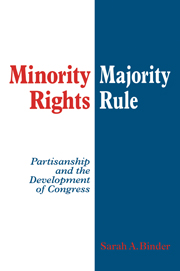Book contents
- Frontmatter
- Contents
- List of tables and figures
- Preface
- 1 The partisan basis of procedural choice
- 2 The evolving concepts of House and Senate minority rights
- 3 Procedural choice in the early Congress: The case of the “previous question”
- 4 Allocating minority rights in the House, 1789–1990
- 5 Institutionalizing party in the nineteenth-century House
- 6 Stacking the partisan deck in the twentieth-century House
- 7 Inherited rules and procedural choice in the Senate
- 8 Assessing the partisan theory
- Appendix 1 Summary of changes in minority rights
- Appendix 2 Measuring congressional workload
- Appendix 3 Measuring party behavior
- Bibliography
- Index
4 - Allocating minority rights in the House, 1789–1990
Published online by Cambridge University Press: 10 December 2009
- Frontmatter
- Contents
- List of tables and figures
- Preface
- 1 The partisan basis of procedural choice
- 2 The evolving concepts of House and Senate minority rights
- 3 Procedural choice in the early Congress: The case of the “previous question”
- 4 Allocating minority rights in the House, 1789–1990
- 5 Institutionalizing party in the nineteenth-century House
- 6 Stacking the partisan deck in the twentieth-century House
- 7 Inherited rules and procedural choice in the Senate
- 8 Assessing the partisan theory
- Appendix 1 Summary of changes in minority rights
- Appendix 2 Measuring congressional workload
- Appendix 3 Measuring party behavior
- Bibliography
- Index
Summary
Adopting a previous question rule in 1811 did not endow House majority parties with firm procedural control over the chamber's business. Despite the potential power afforded by the previous question motion to House majorities, majority parties in the nineteenth century continued to face minorities that were successfully exploiting traditional individual rights. Not surprisingly, those majorities continued to struggle to alter chamber rules in their favor. Even once majority party control of the agenda had crystallized toward the close of the nineteenth century with the adoption of Reed's rules, minority parties still at times succeeded in using existing rules to their advantage. But when minority parties succeeded in gaining new parliamentary rights after 1900, they were usually met by majority parties equally intent on cementing their procedural control. The distribution of procedural rights, in other words, continued to evolve well after the procedural gains of 1811 – sometimes favoring the majority and at other times favoring the minority.
In this chapter, I explore patterns of change in House minority rights between 1789 and 1990. Testing the three broad alternative explanations of change in minority rights sketched in Chapter 1, I present statistical evidence from the course of congressional history to bolster my claims about the partisan basis of procedural choice. I find that short-term partisan goals – constrained by inherited rules – shape both the suppression and creation of rights for political and partisan minorities.
- Type
- Chapter
- Information
- Minority Rights, Majority RulePartisanship and the Development of Congress, pp. 68 - 85Publisher: Cambridge University PressPrint publication year: 1997



